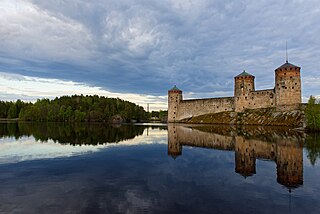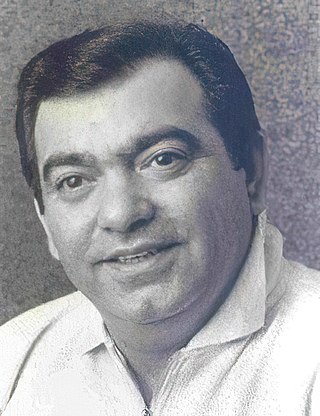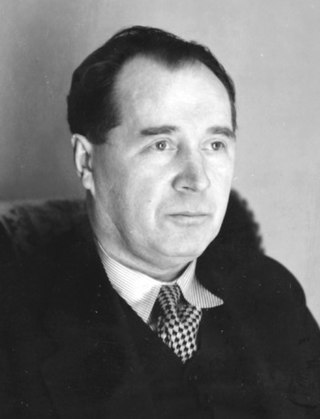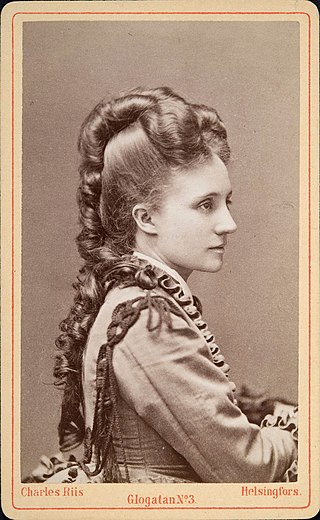
Savonlinna is a town and a municipality of 32,108 inhabitants in the southeast of Finland, in the heart of the Saimaa lake region, which is why the city is also nicknamed the "Capital of Saimaa". Together with Mikkeli, it is one of the largest towns in the South Savonia region and one of the concentrations in the region's hospital districts. The town is internationally known for its medieval St. Olaf's Castle and the annual Savonlinna Opera Festival. It encircles the municipality of Enonkoski.
The music of Finland can be roughly divided into folk music, classical and contemporary art music, and contemporary popular music.

Olavinlinna is a 15th-century three-tower castle located in Savonlinna, Finland. It is built on an island in the Kyrönsalmi strait that connects the lakes Haukivesi and Pihlajavesi. It is the northernmost medieval stone fortress still standing. The castle forms a spectacular stage for the Savonlinna Opera Festival, held for the first time in the summer 1912.

The Royal Opera House (ROH) is an opera house and major performing arts venue in Covent Garden, central London. The large building is often referred to as simply Covent Garden, after a previous use of the site. It is the home of The Royal Opera, The Royal Ballet, and the Orchestra of the Royal Opera House. The first theatre on the site, the Theatre Royal (1732), served primarily as a playhouse for the first hundred years of its history. In 1734, the first ballet was presented. A year later, the first season of operas, by George Frideric Handel, began. Many of his operas and oratorios were specifically written for Covent Garden and had their premieres there.

Aino Ackté was a Finnish dramatic soprano. She was the first international star of the Finnish opera scene after Alma Fohström, and a groundbreaker for the domestic field.

The origins of Finnish opera can be traced to the late 18th or 19th century, when the first opera performances were staged in Finland. It is generally assumed that the first opera performance in Finland took place in 1768 in Turku, when the troupe of Carl Gottlieb Seuerling presented the opera Adam und Eva by Johann Theile. However, other sources state that there was no orchestra at this performance.

Jorma Kalervo Hynninen is a Finnish baritone who performs regularly with the world's major opera companies. He has also worked in opera administration.
Raimo Sirkiä is a Finnish operatic tenor whose repertoire ranges from spinto to dramatic.
Richard Jones CBE is a British theatre and opera director. He was born in London, and studied at the University of Hull and University of London. After working as a jazz musician, he spent 1982–83 on a bursary working with Scottish Opera and the Citizens Theatre.

The Horseman is an opera in three acts by Aulis Sallinen, based on a libretto by Paavo Haavikko. It was premiered by the Savonlinna Opera Festival on 17 June 1975 to celebrate the 500th anniversary of the Olavinlinna Castle, and is the first of Sallinen's operas, and is replete with heavy symbolism and historical allegories. According to George Loomis, writing in The New York Times, the work "is widely credited for helping to precipitate a wave of Finnish operas".

Juha is a three-act opera by Aarre Merikanto, with a Finnish libretto by Aino Ackté based on the 1911 novel of the same name by Juhani Aho. Although completed by 1922, it was only finally staged at the music college in Lahti on 28 October 1963. The story is a drama of a love triangle: the older husband Juha, his young wife Marja, and her seducer the merchant Shemeikka. Set in the 1880s in Kainuu in northern Finland, the human tragedy is based around the harsh realities of a farming community and the clash of their lifestyle with the more worldly nomadic Karelians, represented by Shemeikka.
Markus Simon Fagerudd is a Finnish composer.
Ulf Arne Söderblom was a Finnish conductor and music professor. He was the principal conductor of the Finnish National Opera from 1973 to 1993 and was a key figure in the revival of the Savonlinna Opera Festival. A champion of Finnish music, he has conducted the world premieres of several works by Finnish composers including Kokkonen's The Last Temptations and Sallinen's Kullervo and The Horseman.

Gegham Grigorian was an Armenian operatic tenor.

Juha, Op. 74, is a verismo opera in three acts—comprising six tableaux—written from 1931 to 1934 by the Finnish composer Leevi Madetoja. The libretto, a collaboration between Madetoja and the Finnish soprano Aino Ackté, is based on Juhani Aho's novel by the same name. The story takes place on the border between West Karelia and East Karelia, and features as its central conflict a love triangle between the farmer Juha, his young wife Marja, and a Karelian merchant, Shemeikka. Disillusioned with rural life and seduced by promises of material comfort and romance, Marja runs away with Shemeikka; Juha, who maintains his wife has been abducted, eventually discovers her betrayal and commits suicide by jumping into the rapids.
Tuuli Takala is a Finnish classical singer and operatic soprano.

Emmy Charlotta Achté née Strömer (1850–1924) was an operatic mezzo-soprano, the first prima donna of the Finnish Opera. She performed in Helsinki from 1873 to 1879, excelling in dramatic roles. She was also a voice teacher for over 40 years, starting an opera class at the Helsinki Institute of Music.

Glory Leppänen was a Finnish actress, theatre and film director, and writer.

Thomas de Mallet Burgess is a theatre, musical theatre, and opera director from the United Kingdom. He founded the Perth opera company Lost & Found, and was General Director of New Zealand Opera from 2018 to 2023 before selected as artistic director of Finnish National Opera.














